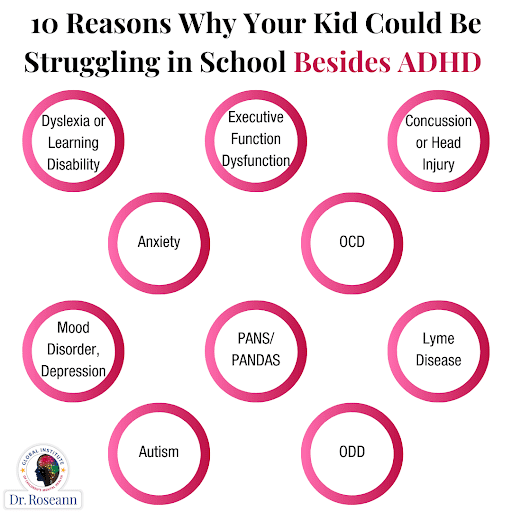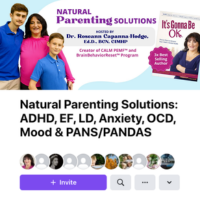We all know how easy it is for someone to struggle with attention and focus, but what most people don’t understand is that there are many reasons why someone could be struggling with attention besides Attention-Deficit Hyperactivity Disorder (ADHD).
Complicating the problem is how inadequate most ADHD intakes really are. Understanding how a clinical diagnosis of ADHD is made helps to see just how easy it is to be misdiagnosed with ADHD when it is really something else. A 15-minute interview with a pediatrician or provider isn’t enough time to really understand what is going on or rule out common reasons why your kids' (or your own) attention may be impaired.
Josh’s Story
Josh came to me at age 14 with a long list of clinical diagnoses, or should I say, a shopping cart full of them! It all started in kindergarten when Josh’s teacher became concerned about his listening skills and difficulty sitting for a long time. His parents, Rachel and Dave did exactly what Mrs. Marks asked them to do and Josh still struggled with attention, listening and learning in the classroom. At Mrs. Marks’ suggestion, they took Josh to the pediatrician, which resulted in a diagnosis of ADHD after a 15-minute appointment and his teacher filling out a rating scale. ADHD meds promptly followed and so began years of one med to another with little success and subsequent diagnoses, including dyslexia, sensory processing disorder, oppositional defiant disorder, anxiety, and finally bipolar disorder. By the time Josh got to me, he was angry, unmotivated and really sad and ashamed. After a QEEG brain map and a solution strategy session, it became clear that Josh’s initial problem was dyslexia with executive function dysfunction and anxiety coming later. Medication only worsened Josh’s anxiety and really triggered mood regulation problems. With clear education about what was going on in his brain and what Josh and his family needed to do to calm his brain with neurofeedback and address his dyslexia, executive functioning issues, and of course his anxiety and depression. With a step by step plan, Josh was able to overcome all of his learning, emotional and behavioral challenges without medication! He went onto college and became a special education teacher.
10 Clinical Diagnoses to Consider Besides ADHD
1. Dyslexia or a Learning Disability
Many kids with learning disabilities struggle with executive functioning and are commonly misdiagnosed with ADHD because people with executive function dysfunction are sluggish language processors. Kids with LDs appear inattentive when they are really just slow in processing language.
In particular, the most common learning disability, dyslexia, is missed because of a lack of understanding what it is. Dyslexia is an inherited condition that involves reading, spelling, and writing difficulties due to the brain’s difficulty identifying speech sounds and then being able to map or match them to letters and words (decoding).
Just like kids with ADHD, dyslexics are often bright and are good at compensating for their difficulties, which they do by memorizing words. Without good phonics skills, children won’t be able to read automatically or fluidly and therefore they will struggle with keeping up with their workload. Even though they appear, “inattentive,” it really is that their brain is trying to process sounds that they should have learned. There is a lot that can be done to support kids with dyslexia and getting them the right reading help and improving their brain’s processing speed are key.
2. Executive Function Dysfunction
ADHD and executive function dysfunction are two separate conditions that have overlapping issues. Executive functioning may be something you have heard about but don’t really know what it is or how it is different from attention. Attention involves the brain’s ability to be alert when it is supposed to (someone calling your name, transitioning from one task to another, staying on task, etc.) and executive function is the brain’s ability to plan and take action toward a future goal or event.
When a kid has difficulty with executive functioning, they don’t think about or connect to future outcomes, so that makes them very disconnected to tasks you are asking them to do. Kids with ADHD always have executive functioning difficulties but not every kid with EF has ADHD. EF difficulties can be part of other clinical conditions, such as concussion, OCD, anxiety, depression, PANS/PANDAS, Lyme, ODD, etc.
Kids who struggle with writing commonly have executive functioning problems. Writing requires a lot of cognitive processing, language and attention skills and more importantly the coordination of those skills to produce a written reflection of your thoughts. Like reading comprehension, writing is incredibly complex and needs for a kid to be focused and motivated.
3. Concussion, Head Injury or Birth Trauma
Mild head injuries and birth trauma are two conditions that I see impacting children’s (and adult’s) focus everyday. People just don’t connect something that your child seemed to recover from to something that is happening years or even a decade or more later. As resilient as the brain is, some mild injuries can affect how the brain functions. Unless an injury is severe, the impact of a mild head injury is often missed unless you are going to a concussion specialist.
A concussion is a type of mild traumatic brain injury (mild TBI) that results from a bump, blow, or jolt to the head or by a hit to the body, as well as sudden acceleration or deceleration that causes the brain to hit the skull with a lot of force. The damage from a mild TBI causes chemical changes in the brain and can cause damage to the brain cells.
Attention difficulties, slow processing, memory difficulties, as well as anxiety and depression are associated with concussions, head injuries, and birth trauma and can lead to life long issues if not addressed.
4. Anxiety
When a person is anxious, their mind is full of worry and not the task at hand, which means a person is often inattentive and struggles to concentrate. Clinical anxiety in children is more than just a period of stress or worry, it involves feelings of tension, worried thoughts and physical changes such as sleep problems, muscle tension, gastro-intenstional difficulties, increased blood pressure, etc. that occurs over a lengthy period of time.
For kids, chronic stress can build over time and cause a breakdown of mental and physical functioning that deteriorates attention, organization, and executive functioning. It is important to note that most kids with ADHD and executive function dysfunction have anxiety because they feel the pressure of constant failure at school and home. Identifying the source of attention difficulties is helpful in determining if it is the attention problems that are causing the anxiety or vice versa.
5. OCD
OCD is a mental health condition that is often confused with clinical anxiety and missed by physicians and mental health providers because it is so hard to “see” the behaviors due to the internal components of obsessive and compulsive thinking. It is only when those internal intrusive thoughts and rituals show themselves as behavioral compulsions and rituals.
When a child or teen has obsessive and compulsive thinking or performs mental rituals such as counting, checking, or is reprocessing, their mind is occupied and they just aren’t paying attention to what people are saying or to what they are supposed to do. They can be incredibly distracted by these intrusive thoughts and behavioral rituals that might be hard to see.
There are a lot of myths about OCD that make getting a proper diagnosis and the right help so much harder than it should be. OCD is a highly treatment resistant condition and that makes getting the right treatment essential. Calming the brain and then teaching a person with OCD to talk back to it with ERP therapy for OCD is a proven solution that restores focus and calm.
6. Mood Disorder/Depression
Kids with impulse control issues and mood, emotional, and behavioral regulation issues often are diagnosed with ADHD, primarily hyperactive or combined type. Moody, irritable kids are hard to parent and they often struggle to get along with family members, peers, and adults.
Kids with mood disorder can display behaviors from outwardly agitated who meltdown to hard to motivate and withdrawn and everywhere in between. Kids with ADHD can show similar behaviors and hence, that is why kids with “behavioral difficulties” get lumped in with kids with ADHD whether they meet the clinical criteria or not. In some cases, moody kids are later diagnosed with a mood disorder such as depression or bi-polar disorder and many become stuck, failure to launch young adults.
7. PANS/PANDAS
With mental health difficulties due to infectious disease increasing, parents should be aware of conditions such as PANS/PANDAS/AE that are linked to difficulties with attention, anxiety, depression, ODD, etc.
PANS/PANDAS/AE are three separate conditions that have similar behaviors and issues such as motor tics, OCD, anxiety, depression, rage, attention and executive functioning difficulties, memory and cognitive processing difficulties, etc. PANS/PANDAS is on the rise and can be quite frightening with its sudden onset or worsening of a pre-existing condition. Many children with PANS/PANDAS/AE have a series of “soft signs” including attention and executive functioning difficulties and slowed cognitive processing, reading and writing difficulties that are displayed before the full onset of PANS/PANDAS.
Testing such as QEEG brain maps combined with blood work are important diagnostic tools that can get to the bottom of the issue and guide your family to the right treatment.
8. Lyme Disease
With Lyme and Tick-borne disease becoming increasingly common, it should always be ruled out before a clinical diagnosis of ADHD, as infectious disease will impact one’s focus, sensory processing, and executive functioning.
The cognitive and mental health impact of Lyme and Tick-borne disease is well-documented in the research, yet frequently missed by providers due to simple lack of training and unwillingness to learn. Getting diagnosed properly and early can save years of heartache for you and your child.
9. Autism
With 1 in 37 children impacted by autism, more and more children are born with this neurodevelopmental disorder that has so many overlapping features with ADHD, including executive functioning difficulties, problems with listening, slow alerting, trouble transitioning, rigidity, impulsivity, sensory difficulties, etc.
The greatest distinguishing feature between ADHD and autism is that even though both may have social difficulties, kids with ADHD have them because of impulsive behaviors but understand implicit social rules whereas kids with autism lack insight into those “grey” more implicit social skills. Moreover, kids with autism lack sustained, reciprocal social engagement skills because their restricted interests get in the way of that back and forth needed to have good interactions with others.
10. ODD
Oppositional Defiant Disorder (ODD) is a clinical diagnosis that is often given to angry, impulsive kids that are hard to parent due to their noncompliant behaviors. These impulsive kids are easily set off and perpetually irritated. Defiant behaviors can be part of many other clinical conditions including ADHD due to these kids' impulsivity and other issues including sensory sensitivity.
I see ODD as always being part of another condition and not a stand-alone diagnosis due to the behavioral nature of the condition. One should always consider other issues such as ADHD, mood disorders, and PANS/PANDAS as the root cause and address the non compliant behavior in therapy.

How Can You Rule Out Other Reasons Why Your Kid Is Struggling With Attention?
As you can see, a common thread in all of these clinical conditions is a lack of the correct diagnosis due to the nature of mental health care over-relying on only a clinical interview despite having proven diagnostic tools such as QEEG brain maps and lab work available.
Dr. Roseann “checks under the hood” and doesn't just rely on interviews, which can easily lead to a misdiagnosis. In a strategy session with Dr. Roseann, we collect information but go one step further and use objective data from a QEEG brain map or a brain check to have a clearer diagnostic picture, which is so important in getting the right treatment plan. Sadly, at least 50% of the time when someone comes to her with an ADHD diagnosis, they really have another clinical condition. There are many reasons why a child or teen may be struggling with attention, motivation, or behavior besides clinical ADHD and those all should be ruled out. Dr. Roseann's specialty is to make sense out of all the information and create a solution plan that calms the brain and makes happy families.
With Dr. Roseann's 30-years of experience in working with thousands of kids and families, she knows how to put the pieces of the puzzle together with objective data to create a solution plan that takes you from chaos to calm. When we work with clients in our trademarked BrainBehaviorReset™ Program, we give families wrap-around support and guidance that addresses root causes.
What Can I Do To Improve My Kid’s Attention, Motivation, and Impulse Control?
Regardless of the clinical diagnosis, when a brain is dysregulated, you will see a range of dysregulated behaviors from internalizing behaviors such as worry, being withdrawn, unfocused to externalizing behaviors such as moodiness, irritability and impulsivity. When you calm the brain with neurofeedback, the brain gets trained to stay in a healthy rhythm, which results in calmer, more focused, faster processing behaviors.
Always remember… “Calm Brain, Happy Family™”
Disclaimer: This article is not intended to give health advice and it is recommended to consult with a physician before beginning any new wellness regime.
Always remember… “Calm Brain, Happy Family™”
Are you looking for SOLUTIONS for your struggling child or teen?
Dr. Roseann and her team are all about solutions, so you are in the right place!
There are 3 ways to work with Dr. Roseann:
You can get her books for parents and professionals, including: It’s Gonna Be OK™: Proven Ways to Improve Your Child’s Mental Health, Teletherapy Toolkit™ and Brain Under Attack: A Resource For Parents and Caregivers of Children With PANS, PANDAS, and Autoimmune Encephalopathy.
If you are a business or organization that needs proactive guidance to support employee mental health or an organization looking for a brand representative, check out Dr. Roseann’s media page and professional speaking page to see how we can work together.
Dr. Roseann is a Children’s Mental Health Expert and Therapist who has been featured in/on hundreds of media outlets including, CBS, NBC, FOX News, PIX11 NYC, The New York Times, The Washington Post,, Business Insider, USA Today, CNET, Marth Stewart, and PARENTS. FORBES called her, “A thought leader in children’s mental health.”

Disclaimer: This article is not intended to give health advice and it is recommended to consult with a physician before beginning any new wellness regime. *The effectiveness of diagnosis and treatment vary by patient and condition. Dr. Roseann Capanna-Hodge, LLC does not guarantee certain results.













